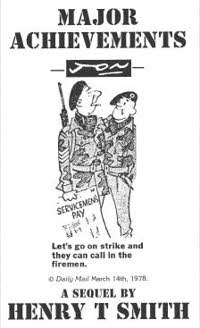 | category : WAR & MILITARY
Part 2 of the "Sergeant Enterprise" Trilogy
One approach to the problem of reforming a crumbling institution is to pose a direct and public challenge to its leadership in the hope of either shaming those at the top into renovating the rotting edifice inside and out and from top to bottom. Another approach is to take it over, demolish the old form and rebuild to a modern and sounder design.
Yet another, more subtle approach is infiltration – using the system against itself, leaving the fabric of the institution largely undisturbed, and remodelling selected key interior structures. In this second case, the Old Guard still stride the corridors of power, unaware that they no longer wield their former degree of influence.
When the institution in question is the nation's Armed services, the second approach offers distinct advantages – the most significant of which is a lack of outcry by the three Ps of democracy: Public, Parliament, and Press. |
A number of army NCOs, worried about the government's cuts in Defence spending and their effects on unofficial sales of ‘surplus' materials, decided to take over a department of the Ministry of Defence. They chose the Combined Services Special Statistical Unit as their target and, by a program of transfers and blackmail over a period of months, they succeeded in providing themselves with the right sort of civilian staff.
In the final phase of Operation Life-Preserver, the NCOs became inspectors for the CSSSU and they acquired commissions. By this time, they had expanded the operation to include similar groups of naval NCOs, who had taken over the neighbouring Combined Services Special Contingency Planning Department, and they had formed an alliance with a group of like-minded junior RAF officers, who had already successfully completed their independent version of Operation Life-Preserver.
The conspirators had gained control of a range of goods and services not available to the general public and generated closer loyalties to one another. Their intentions had broadened from simply doing themselves a lot of good to the grander concept of safeguarding the interests of their respective Services.
Their aim had become to make the Armed Services profitable and quite independent of the whims of politicians.
McAndrew and his associates were able to become involved in a whisky-making project at a germ-warfare research station; providing tanks for an American film-maker called Harve, who was a millionaire enjoying his money in semi-retirement; expansion of an unofficial whisky-exporting business in Scotland; and combatting Icelandic pirates.
|
Unabridged edition, 141 pages, 6.4" x 9" (162 x 229 mm) Paperback/perfect binding,
published by Farrago & Farrago, 1998
Availability: As a free download from Romiley Literary Circle |
|

